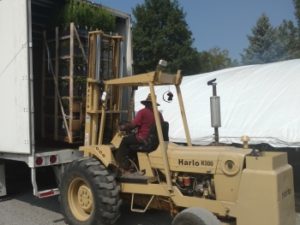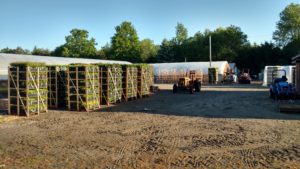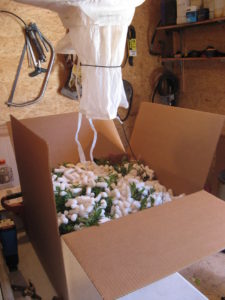Shipping
SHIPPING

One of the main questions we get is, “How are you going to ship the plants?”
Several options tried over the last couple of decades have been narrowed down to two ways that are proven reliable.
We have worked with the same broker at freightquote.com since 2004 for pallet shipping. Ten truck lines provide quotes; he knows which shipping lanes are the most efficient. He calls terminals along the way to make sure our pallets keep moving. Most areas in the upper mid-west and mid-south are one or two days transit.
Shipping is based on the number of trays in the order. Generally less than 24 trays will be shipped either FedEx or UPS Ground in boxes. Greater quantities will be shipped on wooden racks via common carrier.
Our shipping racks hold 48 trays. We can make modifications to the racks to accommodate taller upright plants or reduce the height of the rack with fewer shelves for smaller orders. The racks are very durable and can be used after receiving the shipment to move the plants efficiently in your production.
We pack our boxes with poly peanuts. We tried the biodegradable, starch peanuts, but the humidity in t
he boxes shrunk the size of the peanuts allowing for plant damage in the box. Each box holds two trays. However, shipping charges have gotten so high that we don’t encourage package shipping anymore.
It is more expensive to prepare them for shipping and the price is based on the box dimensions rather than actual weight. We are charged for 50 pounds for our two tray box when it actually weighs about 35 pounds.
A sixteen tray order will be two shelves on a rack and will be about the same shipping cost as package delivery. However, a 24 tray order will cost about the same shipping as the sixteen tray order.
Another shipping consideration is the address. The package carriers charge a residential fee per box when a residence is on site (which includes most nurseries). Shipping charges are not discounted as much as a commercial address (as much as 15-20%). Some of our customers have a shipping address to a local farm store, grain elevator or any other local commercial business, especially if it isn’t convenient to be available for receiving the delivery.


